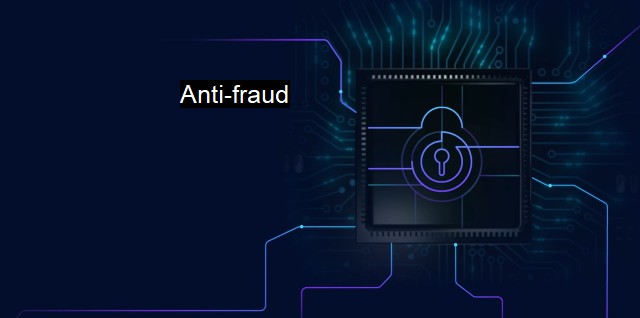What is Anti-fraud?
Exploring the significance of Anti-Fraud Measures in Cybersecurity: Safeguarding Sensitive Information and Preventing Fraud Attacks
Anti-fraud is an essential approach for ensuring that fraudulent activities are curbed. The rise of digital era propagates a surge in cybercrimes, with bad actors constantly devising new ways to orchestrate scams, steal data, or disrupt digital infrastructure. Fraudsters utilize the online environment's relative anonymity to launch sophisticated attacks on inadequately protected systems. Anti-fraud technologies, therefore, play an integral role in safeguarding transactions, safeguarding data, and preventing unidentified access.Fundamentally, anti-fraud is the umbrella for a wide range of tactics, strategies, programs, and technologies designed to detect and prevent dishonest or fraudulent activity. anti-fraud techniques might detect unusual patterns in network traffic, monitor for suspicious user behavior, scrutinize transactions for indicators of fraud, and validate user identities to prevent unauthorized access or insider threats.
One great concern driving the necessity for anti-fraud solutions is the potential financial loss. For businesses, cyber fraud can lead to massive financial losses through data breaches, business email compromises, funds transfer frauds, identity theft, and other forms of fraud. These attacks not only can deplete a company's fiscal resources but also severely damage its reputation and customer trust.
Antivirus software plays an essential role in the larger anti-fraud strategy. By scanning for and identifying threats, antivirus solutions can prevent malware from infiltrating the system. Malware is a common tool fraudsters use to perpetrate their crimes, from phishing attacks designed to trick users into revealing sensitive information, to ransomware attacks that hold data hostage in exchange for payment. Because of these cyber threats, antivirus software and constantly updated virus definitions are critical to a comprehensive anti-fraud initiative.
Anti-fraud software's role in cybersecurity extends far beyond only securing financial transactions. It also focuses on safeguarding a company's digital environment by securing email communications, strengthening firewalls, and buttressing database systems. Cybersecurity firms offer a variety of integrated anti-fraud solutions which use machine learning and artificial intelligence, to identify and block threats even before they infiltrate the system. Common anti-fraud principles this software operates on includes fraud detection; incident response plan; user awareness training; Intrusion Detection Systems; patch management and encryption.
A strong password policy and two-factor or multi-factor authentication (2FA/MFA) are other ways to reinforce anti-fraud measures. Regular password updates and enforcing the use of complex passwords can minimize the risk of brute-force attacks, where a cybercriminal uses trial and error to decode a user's login details. 2FA/MFA makes it more challenging for a fraudster to gain access to a system or data, even if they succeed in decrypting a password.
The importance of user education and awareness as part of a comprehensive anti-fraud methodology cannot be understated. Often, humans are the weakest link in an enterprise's defense, vulnerable to social engineering attacks that trick them into revealing sensitive information.
Anti-fraud methods in cybersecurity are critical in providing a robust shield against the rising incidence of online fraud and scams. The dynamic nature of cyber threats demands proactive measures and constant vigilance. Effective anti-fraud practices can help organizations get ahead of cybercriminals, ensuring that they can maintain the integrity of their systems and preserve the trust of their stakeholders in the digital age.

Anti-fraud FAQs
What is anti-fraud?
Anti-fraud refers to the measures and techniques employed to prevent and detect fraudulent activities. In the context of cybersecurity and antivirus, anti-fraud measures are put in place to protect individuals and organizations from cyber fraud and financial crimes.How does anti-fraud help in cybersecurity?
Anti-fraud mechanisms help prevent phishing and identity theft by detecting and blocking fake websites and fraudulent emails. These measures also help detect and prevent unauthorized access to sensitive data and prevent financial fraud such as credit card theft or fraudulent electronic funds transfers.What are some common anti-fraud techniques used in cybersecurity?
Some common anti-fraud techniques used in cybersecurity include multi-factor authentication, encryption, intrusion detection systems, and fraud analytics. Multi-factor authentication and encryption help prevent unauthorized access to sensitive information, while intrusion detection systems detect and respond to known and unknown threats. Fraud analytics involves monitoring user activity to detect unusual behavior that could be indicative of fraud.Why is it important to have anti-fraud measures in place for antivirus software?
Antivirus software is a critical tool in safeguarding against cybersecurity threats. However, even the best antivirus software can be circumvented by cybercriminals who use fraudulent tactics to gain access to a system. By having anti-fraud measures in place, antivirus software becomes more effective, as it can detect and block fraudulent activity before it impacts the system. This enhanced protection helps individuals and organizations safeguard their data and finances from cybercriminals.Related Topics
Fraud detection Malware prevention Identity theft protection Phishing prevention Encryption technology
| | A | | | B | | | C | | | D | | | E | | | F | | | G | | | H | | | I | | | J | | | K | | | L | | | M | |
| | N | | | O | | | P | | | Q | | | R | | | S | | | T | | | U | | | V | | | W | | | X | | | Y | | | Z | |
| | 1 | | | 2 | | | 3 | | | 4 | | | 7 | | | 8 | | |||||||